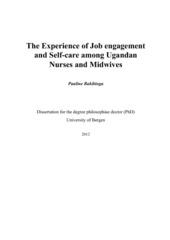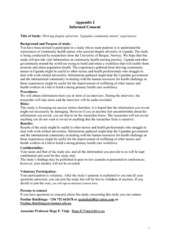| dc.description.abstract | Background: Nurses, the backbone of health care in sub-Saharan Africa, endure various forms of difficulties while on the job and as a result many choose to migrate in search for better opportunities, or leave the profession. Despite the challenges experienced, there are many nurses who remain on the job in their countries, do thrive and stay engaged while on the job. Earlier empirical evidence from Norway produced a theory, the Selftuning Model of Self-care, suggesting processes through which nurses’ job engagement can be preserved amidst workplace adversity. The main aim of this study was to explore the phenomena of job engagement and self-care among Ugandan nurses known to thrive on the job despite having challenging working conditions, using the model as a guide. This study sought to understand ways in which nurses’ job engagement might be enhanced, with the aim to inform training and health care institutions about potential interventions to enhance nurse practitioners’ resilience, motivation, and satisfaction on the job. Methods: An exploratory qualitative study design using a combination of phenomenology and hermeneutics was conducted, with a purposive sample of 15 nurse practitioners with reputations for thriving despite having difficult working conditions; and currently practising within the public and private sectors in two districts in Uganda. Data were collected through in-depth interviews conducted, between March and May 2010, in either the interviewees’ workplaces or at home and lasted from one hour to two hours and 15 minutes. Nurse practitioners were recommended by colleagues for participation in this study. A thematic interview guide was used and modified during the data collection exercise to ensure that major themes of the study questions were captured. As one of the study’s aims was to examine, whether or not the nature of job engagement as experienced by Ugandan nurses relates to Norwegian nurses, the interview guide was adapted from Vinje (2007). In all interviews, nurse practitioners were invited to share their experiences using, ‘Can you please tell-your work life story? One in-depth interview was planned for each participant but with a provision for a repeat, if the need arose. Six interviews were conducted in English (and not repeated). Four were done in English and repeated in the Luganda language because the respondents found it difficult to express themselves in English. The remaining five interviews were done in Luganda. Thus, nineteen interviews were conducted with the 15 nurse practitioners. The interviews conducted in Luganda were transcribed into English. Interview data were analysed using the qualitative content analysis method. The transcripts were analysed using content analysis focusing on the manifest and the latent content. The analytical tool followed a six-step process including multiple reading of the interview transcripts to make sense out of the data, a division of the data into meaning units, condensation of the meaning units, categorisation of the data, and lastly, generation of sub-themes and themes. The analysis was done in two stages, first within cases and then across cases. Results: Paper 1 describes the processes that enabled the nurses to thrive on the job in spite of various work-related challenges. A sense of calling to the profession and meaning are critical to the experience of and maintenance of the nurses’ job engagement. A match between calling and profession gives meaning, zest and vitality to the nurses’ work lives. Even among the nurses who joined the profession out of practical necessity, their job engagement experiences did not differ from their colleagues for whom nursing was, for instance, a childhood dream. When workplace adversity threatens one’s job engagement, a self-care process mediated by reflection and introspection about work life and involving nurses’ abilities to use personal and job resources is set into motion enabling nurses to adjust and cope better on the job. Paper 2 reports on the self-care practices of the nurses. The nurses reported that the serious stressors they experienced in relation to their work included poor pay, having too heavy workloads, trying to make do without vital supplies, struggling to deal with difficult patients, coping with uncooperative workmates, and being distressed by overly demanding and unfair bosses. To mitigate the effects of the various stressors, the nurses engaged in a ‘self-tuning’ process involving introspection, sensibility and reflection resulting in adoption of several coping strategies. Coping was in the form of sharing of experiences, trusting in God’s providence, engaging in other enjoyable activities, letting go, adapting based on experiences, guarding against workplace hazards, preserving quiet time, and or clearly separating work from personal life. Paper 3 describes the various influences of religiosity on the work and personal values and coping strategies of the nurses. All the fifteen participants were found to be actively religious, a fact unknown at the time of recruitment. Religion was found to influence the lives of the nurses in four different ways including the nurses’ choice of profession, their work values, their ability to cope with work stress, and their self-care strategies. Conclusions: The Self-tuning Model of Self-care can be used as a model to understand how thriving nurse practitioners experience and can promote their job engagement, amidst challenging working conditions. In the face of adversity, nursing job engagement was a process whose foundation lay in a sense of calling to the profession, and is characterised by the meaningfulness that nurse practitioners attach to their work, which promotes feelings of zest and vitality at work. Even in instances where one’s choice of profession is dictated by circumstances beyond the individual, this study demonstrated that nurse practitioners can experience job engagement under difficult working conditions, when their personal values coincide with professional nursing values. A self-tuning process involving routine introspection, sensibility to and reflection about ones’ circumstances enabled thriving, especially when job engagement was threatened. When faced with work challenges that threatened their job engagement, the self-tuning process led to active coping in one or several ways. This study showed that religion played a critical role in the work-lives and the stress coping resources of the nurses. Findings from this Ugandan context suggest that nurse practitioners should be encouraged to practice habitual introspection and reflection about the satisfaction they derive from work, to enable them retain a high level of job engagement despite the adversities of nursing practice. Health care managers need to make work environments conducive to enhance job engagement by ensuring that all nurse practitioners have job resources such as working equipment and social support that they need to thrive on the job. This study supports previous research conducted in Norway that self-tuning is a learnable skill, critical in helping nurses cope with workrelated adversity; the skill of self-tuning should be emphasised both during nursing training and on the job. | en_US |
| dc.relation.haspart | Paper 1: Bakibinga, P., Vinje, H. F & Mittelmark, M. B. (2012). Factors contributing to job engagement in Ugandan nurses and midwives. ISRN Public Health, vol. 2012, Article ID 372573, 9 pages, 2012. The paper is available at: <a href="http://hdl.handle.net/1956/6228" target="blank">http://hdl.handle.net/1956/6228</a> | eng |

